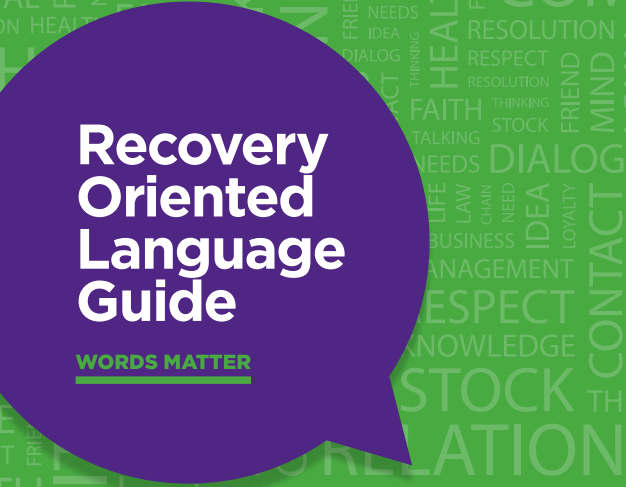Overview
Recovery in mental health is a personal journey, unique to each of us. It doesn’t always mean a cure, but it shows that we can all find ways to live well and thrive.
In the past, recovery was often not seen as an option. Over the years the focus has shifted from isolation to supporting people to live the way they choose and remaining integrated within their communities. Recovery is seen as achievable, with mental health services working to help people to be the leaders of their own lives and stay connected with their communities.
What is Recovery?
The term recovery refers to a deeply personal and unique experience. It can mean different things to different people. Some people welcome it, finding hope and choices in it, while for others it does not resonate and that’s okay.
Mental health recovery is all about shifting the focus from the illness itself to the person experiencing it. It’s not always about reducing symptoms or being symptom-free and could include not going back to your old self or the life you once had. Instead, it’s about taking back your power to make choices and setting out on a new path that’s meaningful to you. Everyone’s journey looks different because we each get to decide what recovery means to us. No one else can tell you what recovery will look like for you.
The idea of recovery moves away from the old stories we might have heard about mental health – those worst-case scenarios and negatively portrayed characters from TV and movies. While it can involve steps forward and backward, ups and downs, the heart of recovery is having the power to choose.
Recovery is a flexible, ever-changing process of growth and self-discovery. It is not an endpoint. It is about connecting with others, finding hope, and understanding your own identity, no matter where you are in life.
On particularly rough days when I'm sure I can't possibly endure more, I remind myself that my track record for getting through bad days has been 100%. And that’s pretty good.
What is Recovery to you?
Recovery has a different meaning for everyone and is what YOU make it. It isn’t necessarily about going back to the life you once knew and for some, is about the birth of an entirely new life and with that, new opportunities.
Recovery is possible. It is deeply personal, and means something for each person."
Whose role is it to determine Recovery?
Recovery is a deeply personal journey which you should be at the centre of. Recovery is not a one-size-fits-all concept, nor is it a solo mission. For some it is a team effort and includes health professionals, family, friends, and other supportive people.
No one can tell you what recovery will look or feel like for you. You decide what fits your life, what you need, and what steps you want to take. You decide what a good life looks like for you.
Myths and Misconceptions
There are many myths and misconceptions about mental health recovery. Finding North has put together some of the most common ones below.
I have a mental health condition, is it possible for me to recover?
If you have heard that there is no hope of recovering from a mental health conditions we can assure you this is a MYTH. Both studies, and our personal experience, show that people living with a mental health condition can and do get better. In fact, many are on their own path to recovery.
Should people with mental health conditions be isolated from the community?
No! Although history shows us that those with mental health conditions have been isolated in psychiatric hospitals, most people recover quickly and don’t need health or hospital care.
For those who do spend time in a hospital setting, not all are placed in seclusion, nor should they be. This is a very old way of thinking and it is our hope that society continues to move away from this. In fact, research highlights the importance of human contact and connection in maintaining our mental wellbeing. Loneliness and isolation on the other hand, have a negative affect.
Is Recovery a cure for mental health conditions?
Recovery is not a cure and has a different meaning for everyone. For some recovery is about being able to manage their symptoms as opposed to being symptom free.
Is Recovery determined by a Health Professional?
It is not the role of a health professional to tell you what recovery is for you.
No one can tell you what recovery will look or feel like for you. You decide what fits your life, what you need, and what steps you want to take. You decide what a good life looks like for you.
One of the biggest lessons that I learnt to accept is that recovery is not the same thing as being cured. After 21 years of living with this thing it still hasn’t gone away.
History of Recovery
The idea of recovery in mental health didn’t always exist. The way Western Society views mental illness has come a long way, though there’s still progress to be made. In the past, mental health care meant isolating people with mental conditions in asylums and exposing them to harsh treatments. These places were far from places of healing.
But things started to change in the mid 90’s with the rise of what is known as the consumer, survivor, or ex-patient movement. This was like a rebellion against the old ways and a strong push for better patient rights. Real people with mental health conditions began sharing their stories and challenging the old system.
In the 1980s and 1990s, the term “recovery” began to be recognised and was seen as a symbol of hope. Recovery showed that people with mental health challenges can follow their dreams and have meaningful lives. It is a way of saying “You are wrong; this will not be my life, I will not be hidden, I will find a way.” This shift in how we see mental health has changed the story from a time of isolation to one where recovery is possible, bringing hope and strength to people.
Further Resources: Learn More Here
Leaders in Mental Health Recovery
Over the years, a group of influential individuals have emerged as leaders in the recovery movement, actively paving the way for positive change. While the list is extensive, a few notable figures are highlighted below.
- Pat Deegan, an American psychologist and advocate in the survivor movements, proudly identifies as a person with lived experience. Pat firmly believes in each person’s ability to take control of their own recovery journey. Her work offers a transformative perspective deeply rooted in personal experience, leaving a profound impact on countless lives.
- Mary O’Hagan, is a mental health educator, writer and advocate who seamlessly integrates her lived experience into her work. As a pioneer of the service user movement in New Zealand, Mary believes that each person should be an active agent in their own recovery journey. Her fundamental message is that madness is profoundly disruptive but full human experience.
- Sandy Watson was among the first consumer workers employed by a public mental health service in Australia in 1993. Committed to challenging stigma and discrimination in the mental health, Sandy has played a pivotal role in reshaping society’s perspective on mental health. Her efforts are focused on cultivating environments that foster inclusivity and understanding.
- Kath Thorburn – With three decades of expertise as a mental health clinician, educator, facilitator, and consultant, Kath Thorburn also brings the unique perspective of a family member. Renowned for her collaborative approach, Kath is recognised for employing lived experience-led strategies in her work.
“Illnesses do not recover, people do” – Pat Deegan
"I am learning to own my voice, story, and personal journey of recovery. I have recognised that no one is beyond saving, no one is broken or beyond help, myself included." - Zoey - Finding North Network
"I'm glad I didn't know I was going to be the chair of an international network, advise the United Nations or become a New Zealand mental health Commissioner. If I had told a Psychiatrist I was going to do these things, they would have upped by antipsychotics on the spot. They kept telling me I had an ongoing disability and needed to lower my horizons. I'm so glad they were wrong." - Mary O'Hagan
"It is deeply personal, and it means something different for each person." - Hayley, Finding North Network
Recovery Movements
Mad Pride, the Consumer Movement, and Recovery in the Bin (UnRecovery) are all ways for you and others to change how we think about mental health. They want you to know that it’s perfectly okay to be yourself and that you don’t need to be “fixed.” Instead, they encourage you to take pride in who you are and find your own path to feeling better. These movements help you understand that there’s no one-size-fits-all approach to mental health, and they want you to have a say in how you get better.
MAD Pride
Is a mass movement of people living with a mental health condition that rejects the concept of ‘mental illness.’ Mad Pride advocates that a person should be proud of their mad identity, seeking to reclaim labels that in the past have been used against them, the idea that someone is broken and in need of being fixed.
Learn more about MAD Pride.
The Consumer Movement
The consumer movement is a social movement that focuses on the promotion of social change, rights, advocacy, and reclaiming power. The consumer movement is based on the perception that those with lived and living experiences of a mental health condition are the experts and can provide valuable knowledge and insights regarding mental health care.
The consumer movement may also be referred to as
- consumer participation
- psychiatric survivors’ movement
- survivor movement
- ex-patient movement.
This movement led to consumer advocacy available in psychiatric hospitals and wards in Australia.
Learn more about the Consumer Movement.
Recovery in the bin (UnRecovery)
Recovery in the bin is described as a critical theorist and activist collective. It is about seeing “Unrecovered” as just as valid as “recovered” The movement acknowledges that for some people, the concept of recovery may never resonate, but it asserts their right to lead a life of their choosing.
Those who resonate with the term UnRecovery recognise that some important principles of “recovery” should be kept intact. However, these principles don’t have a one-size-fits-all approach and pressure should not be placed on a person to recover.
“Recovery in the bin” introduces something called the “UnRecovery Star,” which acts like a “Social Justice tool.”
To learn more visit recoveryinthebin.org
Clinical and Personal Recovery
When exploring the idea of recovery, you might come across terms like Clinical Recovery and Personal Recovery.
Clinical recovery is a viewpoint often shared by doctors and other healthcare professionals, generally focusing on reducing symptoms or making them go away.
Personal Recovery is all about working towards what matters most to you and helps you to feel well.
Recovery is different for everyone. Some people may see medication as a vital part of their recovery journey, while others may not.
In essence, recovery is a uniquely personal journey, where you can choose your own path, whether it is through clinical intervention or pursuing what truly resonates with you, or perhaps a bit of both.
I fall down quite a bit, and each time there is a recovery. However, I know that I WILL get back again, with the supports and strategies I have in my life
Models and Programs
Navigating the path to mental well-being is a unique journey for everyone. For some, understanding different recovery approaches can like having a helpful guide. There are a number of different models available, each offering a unique view, and we want to help you navigate through them. Here are a few examples to get you started
CHIME
Chime is a recovery model that focuses on connecting with individuals and their communities. CHIME is about Connectedness; Hope and Optimism; Identity; Meaning; and Empowerment.
Support Recovery STAR (Steps To Active Recovery)
The Support Recovery Star is a framework for assessing and supporting recovery in mental health with the goal of living well with a mental health condition.
Self Righting Star
Helen Glover created the Self Righting Star® framework as a powerful perspective to delve into recovery and self-righting processes within different aspects of life, work, and leadership.
Collaborative Recovery Model
The Collaborative Recovery Model is an approach that focuses on partnership and shared decision making between the person seeking support for their mental health, and their treating health professionals. This model focuses on a persons strengths, values, and goals.
Mental Health First Aid (MHFA)
Mental Health First Aid is a training program that teaches people how to provide initial support to someone experiencing a mental health or emotional crisis. The training covers various mental health conditions and aims to reduce stigma surrounding mental health issues and increase the likelihood that someone experiencing a crisis will receive quick and appropriate assistance.
Personal Medicine
The Personal Medicine approach is about understanding that everyone’s journey to feeling better is unique. It is about figuring out what makes you feel good and helps you stay well. What works best for you on your path to feeling better.
Supporting Someone
Supporting someone with a recovery approach in mental health is about understanding and respecting their individual needs and journey to well-being. Remember, everyone is different. Take time to build your knowledge about mental health and wellness, engaging in open conversations and actively listening. It’s important to recognise that recovery isn’t always a straightforward path, and setbacks are a natural part of life for us all.
Remember, the person you’re supporting is in charge of their own recovery, deciding which supports to access or not access. Your role is to be there with empathy, patience, and encouragement, fostering a supportive environment for their journey.
Other Resources

The Recovery Language Guide is a helpful tool that uses contemporary and inclusive language. The guide provides examples of what to and what not to say, contributing to the important goal of reducing stigma around mental health.
Pat Deegan’s Academy Library, offers a number of self-paced e-learning opportunities focusing on Recovery, Personal Medicine, Shared Decision Making and more.


